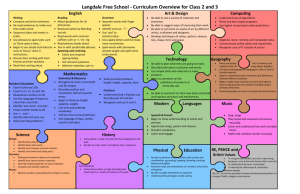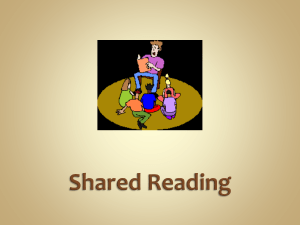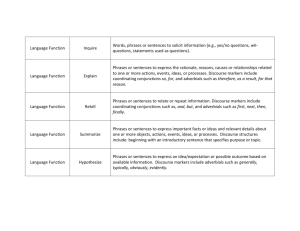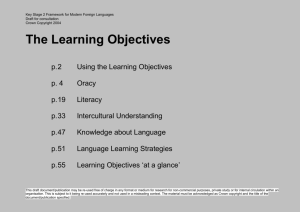French curriculum content overview for all year groups
advertisement
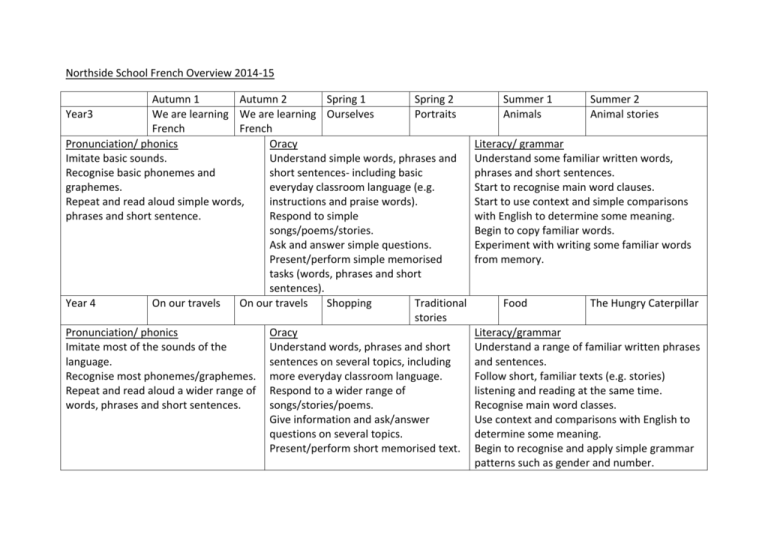
Northside School French Overview 2014-15 Autumn 1 Autumn 2 Spring 1 Spring 2 Year3 We are learning We are learning Ourselves Portraits French French Pronunciation/ phonics Oracy Imitate basic sounds. Understand simple words, phrases and Recognise basic phonemes and short sentences- including basic graphemes. everyday classroom language (e.g. Repeat and read aloud simple words, instructions and praise words). phrases and short sentence. Respond to simple songs/poems/stories. Ask and answer simple questions. Present/perform simple memorised tasks (words, phrases and short sentences). Year 4 On our travels On our travels Shopping Traditional stories Pronunciation/ phonics Oracy Imitate most of the sounds of the Understand words, phrases and short language. sentences on several topics, including Recognise most phonemes/graphemes. more everyday classroom language. Repeat and read aloud a wider range of Respond to a wider range of words, phrases and short sentences. songs/stories/poems. Give information and ask/answer questions on several topics. Present/perform short memorised text. Summer 1 Animals Summer 2 Animal stories Literacy/ grammar Understand some familiar written words, phrases and short sentences. Start to recognise main word clauses. Start to use context and simple comparisons with English to determine some meaning. Begin to copy familiar words. Experiment with writing some familiar words from memory. Food The Hungry Caterpillar Literacy/grammar Understand a range of familiar written phrases and sentences. Follow short, familiar texts (e.g. stories) listening and reading at the same time. Recognise main word classes. Use context and comparisons with English to determine some meaning. Begin to recognise and apply simple grammar patterns such as gender and number. Year 5 Sports Write familiar words, phrases and short sentences using a model. Write some words and phrases from memory. At the weekend In town In town Healthy Journey to Lifestyle school Pronunciation/phonics Oracy Read aloud new words, phrases and Listen attentively and understand the short sentences (apply phonic main points in a short passage made up knowledge). of several simple sentences of familiar language. Understand and express feelings and simple opinions. Respond to a wider range of songs/poems/stories, interacting confidently with unfamiliar language. Prepare/give a short presentation on a familiar topic, using a model. Join in short conversations- reusing some familiar language in new contexts. Literacy/grammar Understand the main points from short written passages made up from familiar language. Follow longer texts (e.g.stories) listening and reading at the same time. Use context and previous knowledge (e.g. via the word family route) to determine some meaning. Recognise and apply grammar patterns such as negatives and simple verb conjunctions. Write sentences and short texts- increasingly using language in new combinations-using support (models/reference sources). Start to do so without support. Develop ability to understand new words that are introduces into familiar written material ,including using a dictionary. Year 6 World War 2 World War 2 Pronunciation/phonics Read aloud short texts which contain some unfamiliar words (apply phonics knowledge). Our schoolavoir et etre Clothes Oracy Understand the main points and some detail in a passage of familiar languageincluding opinions. Understand longer and more complex phrases or sentences. Respond to a wider range of songs/poems/stories, interacting confidently with unfamiliar language. Express feelings, opinions and ideas using a wider range of language. Use French confidently and in a clear audible voice to give prepared presentations,to initiate and sustain conversations and to tell stories. A Day in my Life Presentations/Holidays Literacy/grammar Understand the main points and some detail from short written passages made up of familiar language. Identify different text types and begin to read short texts independently for enjoyment or information. Use knowledge of word formation, of sentence structure and of text structure to determine some meaning. Describe people, places, actions Recognise and apply more grammar patterns including simple high frequency verb patterns in more than one time sequence. Write sentences and short texts on a wider Describe people, places, things and actions orally. range of topics (to describe people, places, things and actions) using a model and using appropriate text conventions. Write several sentences from memory. Use a bilingual dictionary with more confidence.

